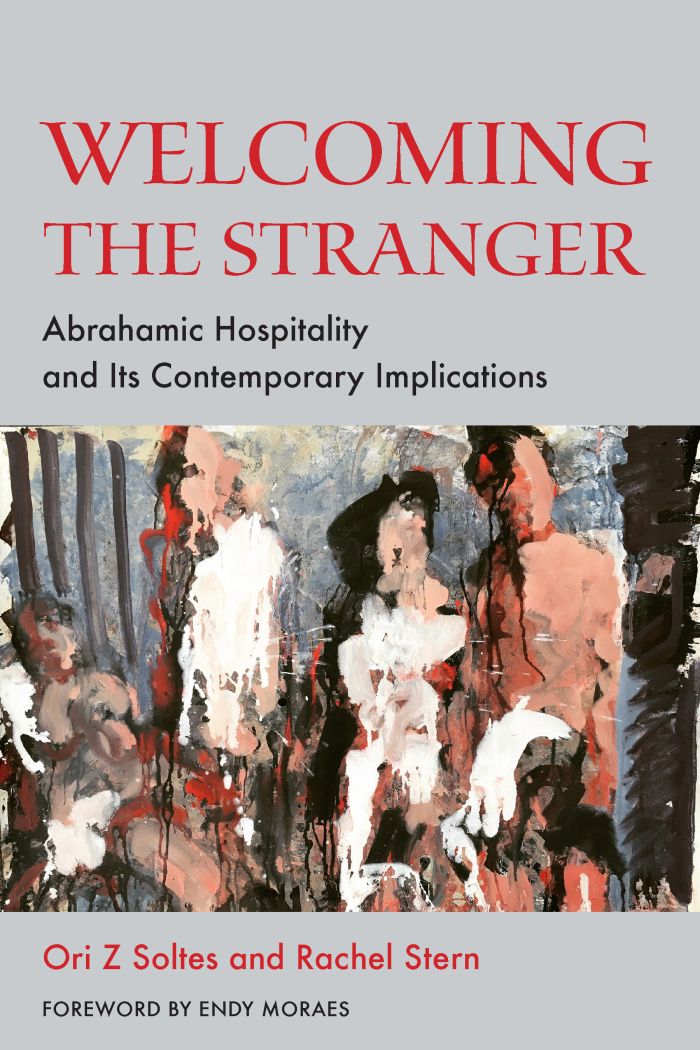Welcoming the Stranger
Abrahamic Hospitality and Its Contemporary Implications

This book can be opened with

Embracing hospitality and inclusion in Abrahamic traditions
One of the signal moments in the narrative of the biblical Abraham is his insistent and enthusiastic reception of three strangers, a starting point of inspiration for all three Abrahamic traditions as they evolve and develop the details of their respective teachings. On the one hand, welcoming the stranger by remembering “that you were strangers in the land of Egypt” is enjoined upon the ancient Israelites, and on the other, oppressing the stranger is condemned by their prophets throughout the Hebrew Bible.
These sentiments are repeated in the New Testament and the Qur’an and elaborated in the interpretive literatures of Judaism, Christianity, and Islam. Such notions resonate obliquely within the history of India and its Dharmic traditions. On the other hand, they have been seriously challenged throughout history. In the 1830s, America’s “Nativists” sought to emphatically reduce immigration to these shores. A century later, the Holocaust began by the decision of the Nazi German government to turn specific groups of German citizens into strangers. Deliberate marginalization leading to genocide flourished in the next half century from Bosnia and Cambodia to Rwanda. In the aftermath of September 11, 2001, the United States renewed a decisive twist toward closing the door on those seeking refuge, ushering in an era where marginalized religious and ethnic groups around the globe are deemed unwelcome and unwanted.
The essays in Welcoming the Stranger explore these issues from historical, theoretical, theological, and practical perspectives, offering an enlightening and compelling discussion of what the Abrahamic traditions teach us regarding welcoming people we don’t know.
Welcoming the Stranger: Abrahamic Hospitality and Its Contemporary Implications is available from the publisher on an open-access basis.
Published by The Fritz Ascher Society for Persecuted, Ostracized and Banned Art and the Fordham University Institute on Religion, Law and Lawyer’s Work
This timely book offers theoretical and practical reflections on 'welcoming the stranger.' From the theological analysis of Abraham to the legal and political discussion of immigration and refugees, the volume explores how hospitality—welcoming the 'other' into our tents—leads to peace and improving the world.—Mehnaz Afridi, Director, Holocaust, Genocide & Interfaith Education Center and Professor, Religious Studies, Manhattan College
Ori Z Soltes teaches at Georgetown University across a range of disciplines, from art history and theology to philosophy and political history. He is the former Director of the B’nai B’rith Klutznick National Jewish Museum.
Rachel Stern (Edited By)
Rachel Stern is the founding and executive director of the Fritz Ascher Society for Persecuted, Ostracized and Banned Art in New York.
Endy Moraes (Foreword By)
Endy Moraes, LLM, Director, Institute on Religion, Law, and Lawyer’s Work at Fordham Law School, is a Brazilian lawyer with extensive experience in interreligious and intercultural dialogue. Endy has an LLM, cum laude, from Fordham Law School, and is admitted to practice in New York. She is a member of the Focolare Movement of the Catholic Church, living in community.
Image List | vii
Foreword | xi
Endy Moraes
Preface | xv
Ori Z Soltes and Rachel Stern
Introduction | 1
Section One: Building on the Past: Theology, History, and Their Practical Implications | 9
1 Welcoming the Stranger in the Jewish Tradition | 11
Ori Z Soltes
2 Hospitality in Christian Traditions: A Key Virtue and its Applications | 27
Thomas Massaro
3 A Migrant 4 Life Journeys to the New Tower of Babel: Christianity and Immigration | 43
Craig Mousin
4 Welcoming the Stranger in Islam: Abrahamic Hospitality and Contemporary Implications | 72
Zeki Saritoprak
5 Epilogue: India and the Dharmic Traditions of Hospitality | 82
Ori Z Soltes
Section Two: Building the Present and Future: Programmatic Ideas and Realizations | 95
6 Fritz Ascher: A Jewish Artist in Germany | 97
Rachel Stern
7 Welcoming Beyond Offering Safe Heaven: Aspiring to Partner with Refugees | 125
Carol Prendergast
8 De-story to Destroy, Re-Story to Restore | 137
Mohsin Mohi-Ud-Din
9 Immigration Courts in Need of an Article I Overhaul | 155
Mimi Tsankov
10 Epilogue: Future Strangers: Digital Life and Hospitality To-Come | 159
Lindsay Anne Balfour
Conclusions: An Unfinished Epilogue | 177
Ori Z Soltes
Bibliography | 181
Author Biographies | 189
Index | 193



